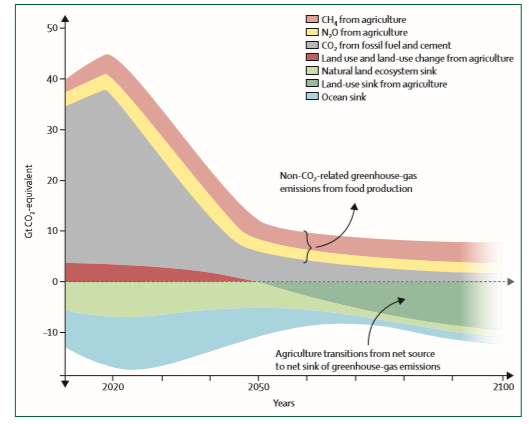|
|
|
|
Figure 1: Our food habits - especially heavy meat consumption - are directly responsible for deforestation to raise more cattle. The middle picture from National Geographic which shows a rainforest is cleared for cattle farming along the Trans-Amazonian Highway. What is worse is that meat production is a highly inefficient use of resources (PNAS paper). The statistics for the picture on the right from onegreenplanet.org. |
|
|
|
We are losing animals and plant species at 100X the rate of previous era due to agriculture
We have entered the sixth mass species extinction on Earth, losing species at a rate 100–1000 times greater than Holocene rates. According to the International Union for Conservation of Nature, 80% of extinction threats to mammal and bird species are due to agriculture as about 75% of land and 66% of oceanic areas have been significantly altered by large production of food.
So why are we destroying the climate, species, and making infectious diseases more likely?
Mostly for more meat. The World Bank reported that cattle ranching occupies 80% of all converted lands in the Amazon rainforest. Producing meat is also hugely resource intensive - it needs 15,000 liters of water to produce 1 Kg. of meat vs. 1,250 liters for 1 Kg. of wheat. Producing meat and dairy consumes 1/3rd of all water in the world and 1/3rd of all crops in the world. To make it worse, cattle generate the most greenhouse emissions (18%).
Instead of giving up your car, be vegetarian every other day and help!
For the 50th anniversary of Earth Day (April 22, 2020), let us cut our carbon footprint by 25% by being vegetarian every other day since giving up beef (and meat) is more effective than giving up our cars!
On the right => check out the scientist warning about deforestation leading to coronaviruses risk in 2018! National Geographic article in 2019 and Forbes - the more mainstream magazine - AFTER the fact in March 2020. |
|
|
|
|
|
|
Figure 2: On the left, a Nature paper shows the high current (2010) and projected (2050) environmental impacts of animal products. A guardian infographic captures the dietary changes recommended by scientists to keep global temperatures rise to under 2C by 2050.
|
|
|
As we change our habits, agriculture can start helping absorb the carbon (CO2)
Simulations included in the EAT- Lancet metastudy suggest that as we switch to a more plant based diet, the burden on the planet will be lower and agriculture will go from being a net negative in the sense of CO2 emissions to actually a net sink or absorber of greenhouse gases which will be an incredibly positive impact. |
|
|
 |
Figure 3: Simulations From EAT- Lancet metastudy. Projections of global emissions to keep global warming to well below 2°C, aiming for 1.5°C Data are from the Intergovernmental Panel on Climate Change's fifth assessment report (RCP2.6 data for nitrous oxide and methane) and Rockström and colleagues28 (for fossil-fuel emissions, land use, land-use change, and forestry, and biosphere carbon sinks). |
|
|
|
|
|
|
Surviving Quarantine Life: Hacks from Sabzbag Communtiy |
|
|
